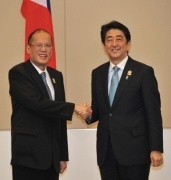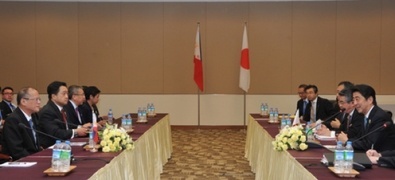Japan-Philippines Relations
Japan-Philippines Summit Meeting
November 12, 2014
 Photo: Cabinet Public Relations Office
Photo: Cabinet Public Relations Office
 Photo: Cabinet Public Relations Office
Photo: Cabinet Public Relations Office
On Wednesday, November 12, for approximately 30 minutes from around 4:45pm (local time), Prime Minister Shinzo Abe held a meeting with Mr. Benigno S. Aquino III, President of the Republic of the Philippines, during the Prime Minister's visit to Myanmar to attend ASEAN-related Summit Meetings. The outline of the meeting is as follows.
- 1. Opening remarks
- 2. Bilateral relations
- 3. Regional situation and cooperation in the international arena
1. Opening remarks
Prime Minister Abe stated that the Philippines is Japan's strategic partner that shares basic values and strategic interests, and Japan would like to further deepen their bilateral relationship with the Philippines and jointly address common challenges. President Aquino extended his condolences to the victims of the eruption of Mt. Ontake and typhoon disasters in Japan, and expressed his gratitude to Japan for its assistance to the last year's typhoon disaster in the Philippines. The two leaders shared the view that they would strengthen bilateral cooperation in the areas of disaster prevention and disaster response as countries experiencing frequent natural disasters.
2. Bilateral relations
(1) Political and security relations
A. Prime Minister Abe stated that Japan continues to promote initiatives as a "Proactive Contributor to Peace" for which President Aquino has repeatedly expressed his strong support. Prime Minister Abe also explained recent developments, including the cabinet decision in July 2014 on the basic policies for developing security legislation. The two leaders shared the view that both countries would further deepen bilateral security and defense cooperation.
B. With regard to the Mindanao peace process, Prime Minister Abe stated that Japan hopes for the steady progress of the transition process towards the establishment of an autonomous government in 2016, and that Japan continues to stand ready to offer its assistance. President Aquino once again expressed his gratitude to Japan's assistance (Note: Japan has extended over 15 billion yen in assistance since 2006).
(2) Economic relations and people-to-people exchanges
A. Prime Minister Abe stated that Japan considers the improvement of the business environment in the Philippines as important that will contribute to the further activation of investments by Japanese companies, and asked President Aquino to act for establishing better business environment. President Aquino explained the efforts of the Philippine government for attracting more foreign investment.
B. Prime Minister Abe stated that Japan stands ready to maximize to support for the Philippine's effort to establishing the basis for economic growth. In this regard, Prime Minister Abe announced Japan's decision to extend ODA loans totaling approximately 20 billion yen for a transportation infrastructure development project (Note 1) and a flood management project (Note 2). President Aquino expressed deep appreciation for the support as well as strong hopes for Japan's continued assistance for the improvement of infrastructure, including urban transport networks.
B. Prime Minister Abe stated that Japan stands ready to maximize to support for the Philippine's effort to establishing the basis for economic growth. In this regard, Prime Minister Abe announced Japan's decision to extend ODA loans totaling approximately 20 billion yen for a transportation infrastructure development project (Note 1) and a flood management project (Note 2). President Aquino expressed deep appreciation for the support as well as strong hopes for Japan's continued assistance for the improvement of infrastructure, including urban transport networks.
C. Prime Minister Abe explained that since September 2014, Japan implemented further relaxation of visa requirements for nationals of the Philippines, under Japan's "Action Program toward the Realization of Japan as a Tourism-Oriented Country". President Aquino welcomed this measure.
3. Regional situation and cooperation in the international arena
(1) The two leaders exchanged views regarding the current regional situation, and reaffirmed the importance of the "rule of law" at sea, including the South China Sea.
(2) Prime Minister Abe explained recent developments related to improvements in Japan-China relations, including the holding of a Japan-China summit meeting.
(3) President Aquino stated that the Philippines supports Japan's bid for permanent membership in the United Nations Security Council.
(Note 1) Metro Manila Interchange Construction Project (Phase VI) (up to 7.929 billion yen)
This project will construct interchanges at intersections where traffic congestion is severe in the Manila metropolitan area. It is intended to ease traffic congestions, and thereby, improve transport efficiency in the Manila metropolitan area and contribute to improving the city environment. Specifically, interchanges will be constructed in four arterial interchange sections in the Manila metropolitan area.
(Note 2) Flood Risk Management Project for Cagayan de Oro River (up to 11.576 billion yen)
This project will carry out river improvement work for Cagayan de Oro River in Mindanao Island. This project is designed to reduce flooding disasters at the river basin as well as contribute to the stable economic development of this area. The project's activities include the construction of levees and floodwalls, bridge repairs, the elevation of escape roads, and community outreach programs.

